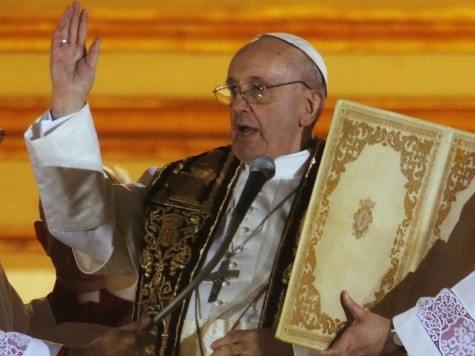
Vatican Radio reported Wednesday that Pope Francis has set up a Pontifical Commission that is charged with drawing up an “exhaustive” report of the status and activities of the Vatican bank, the Institute for Religious Works (IOR).
The Commission consists of five members, including two U.S. natives, Harvard Law professor Mary Ann Glendon and Monsignor Peter Bryan Wells of the Vatican Secretariat of State.
According to Father Federico Lombardi, Vatican press office director, the Commission’s task is to carry out inquiries and present the Holy Father with a report of findings “in view of possible reform.”
Lombardi noted that no deadline has been set for the final report, and that, once finished with its task, the Commission will be dissolved, indicating that the group is not expected to take a role in actually governing the bank. The main goal of the Commission, Lombardi said, will be to study the IOR’s activities so that Pope Francis can determine if it is consistent with the Church’s mission.
Francis released his Chirograph–a tool under canon law that provides the Commission with legal force–that establishes the Commission on Wednesday. In it, he stated:
With his Chirograph of 1 March 1990, Blessed John Paul II established the Institute for the Works of Religion as a public juridical entity, giving the Institute a new configuration while maintaining its name and purpose. With the same perspective, taking into account that he wished to better adapt the Institute’s structures and activities to the needs of the times; following the invitation of Our Predecessor Benedict XVI to allow the Gospel principles to permeate even the activities of an economic and financial nature; having heard the opinion of various Cardinals and other brothers in the Episcopate as well as other collaborators; and in light of the need to introduce reforms in the Institutions that give aid to the Apostolic See; We have decided to establish a Referring Commission for the Institute for the Works of Religion that will gather accurate information on the Institute’s legal position and various activities, in order to allow, if necessary, a better harmonization of the same with the universal mission of the Apostolic See. The Commission is to carry out its proper duties in accordance with this Chirograph and Our working arrangements.
According to Catholicculture.org, the Vatican bank has been a subject of great concern for Church leaders in recent months. Just prior to the conclave that elected Pope Francis, the IOR was reportedly mentioned often by cardinals as in need of considerable reform.
Though the Vatican instituted some changes several years ago, designed to bring the bank into compliance with new European regulations against money-laundering, the IOR continues to receive rebukes from banking regulators in Italy. In 2010, Roman magistrates froze $33 million the IOR held in an Italian bank, charging violations of transparency protocols. Though the money was released the following year, a criminal investigation into the matter remains open.
Pope Benedict XVI created a new financial oversight unit, which recently reported that it detected six attempts to use the Holy See to launder money last year, and seven attempts this year thus far.
Pope Francis appointed Monsignor Battista Mario Salvatore Ricca earlier this month to serve as the bank’s “prelate” to oversee its operations.
John Allen, Jr., writing at National Catholic Reporter, said that Pope Francis’ move to establish the Commission is “a clear signal of a desire for transparency and accountability.” Allen believes Francis’ actions indicate that he will “take a personal interest in the bank as opposed to relying on others to make decisions in his name.”
Allen writes:
The chirograph gives the commission power to collect documents and to interview personnel, specifying that traditional Vatican requirements of secrecy will not impede its access to information.
The chirograph instructs personnel of the bank, formally known as the Institute for the Works of Religion, and other Vatican officials to cooperate with the commission. It says the commission can interview Vatican personnel as well as others either by request or “spontaneously” — seen as a not-so-subtle invitation for anyone with concerns to come forward.
According to Allen’s sources, the members of the Commission were not so much selected because of their expertise in finance areas, but, instead, because of their reputation for “moral rectitude” and for having the trust of the pope.
The Vatican bank controls about $7 billion in assets over 19,000 depositor accounts, and employs 114 people.

COMMENTS
Please let us know if you're having issues with commenting.